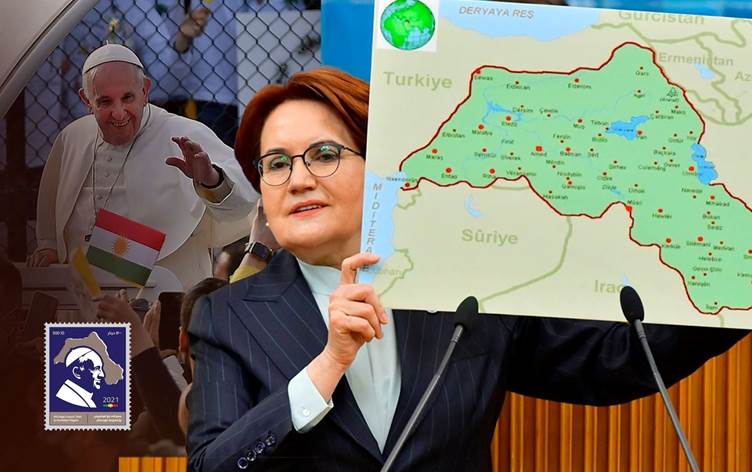
Left to right: A stamp showing the pope and map of greater Kurdistan, and Meral Aksener holds a map of greater Kurdistan at Turkish parliament on March 10, 2021. Graphic: Ahmed Bahram/Rufaw
ERBIL, Kurdistan Region — Turkish politicians and officials have continued to voice their anger over the inclusion of Kurdish areas in Turkey in a stamp released by the Kurdistan Regional Government (KRG) to commemorate the pope’s visit to the Kurdistan Region.
“That despicable map is already under our feet,” ultranationalist politician and leader of the Nationalist Movement Party (MHP) Devlet Bahceli tweeted on Wednesday. “It is derogatory to join the separatists and terrorists and form an alliance with them ” he added, referring to the Kurdistan Workers’ Party (PKK) - which is considered by Ankara to be a terrorist organization.
As part of his historic visit to Iraq, the pontiff visited the Kurdistan Region’s capital city of Erbil on Sunday, holding Mass at Franso Hariri stadium. The KRG’s Ministry of Transportation and Communication released the designs of six stamps to mark the visit, including a stamp with the pope and the map of greater Kurdistan which includes the Kurdistan Region and Kurdish areas in Turkey, Iran and Syria, divided between the countries under the 1916 Sykes-Picot Agreement.
Both Turkey and Iran officially slammed the move on Wednesday, with Ankara saying “presumptuous” authorities “abused” the visit for “unrealistic aspirations against the territorial integrity of Iraq’s neighboring countries” and Tehran calling for “the immediate reversal of this unfriendly action.”
Meral Aksener, leader of the ultranationalist Iyi (Good) Party, spoke at the Turkish parliament on Wednesday, showing members of her party pictures of the stamp and the map of greater Kurdistan.
“What does this map represent? This is the so-called map of Kurdistan. What does this map include? In addition to northern Iraq, it includes part of Anatolia's southeast and east,” she said, referring to the southeast and east of Turkey
The Iyi Party has changed its Facebook’s cover photograph to the Aksener with the map.
The KRG’s Minister of Transportation and Communication Ano Abdoka said on Tuesday the designs “are not final” and the ministry’s work is “always within the framework of respecting the constitution and the national sovereignty of Iraq, land and people.”
KRG spokesperson Jotiar Adil also said the design proposals have yet to be accepted, but Turkish officials have continued to voice their anger.
Turkey’s Ambassador to Iraq Fatih Yildiz also opposed the design and posted a map of modern Turkey on his Twitter account. “Although everyone knows, I let it [Turkish map] stay here for a while as a reminder,” he wrote.
Due to its considerable reliance on Turkey, especially regarding the oil sector, the KRG is not expected to finalize the stamp.
Turkey’s ruling Justice and Development Party (AKP) has also slammed the stamp.
The pro-Kurdish Peoples’ Democratic Party (HDP) in Turkey has neither slammed the stamp nor endorsed it, with its parliamentary deputy head Meral Denis Bestas saying questions on the stamp must be directed to Kurdistan Region leaders – not the HDP.
The reactions are reminiscent of 2017, when Turkish parties issued strong statements against the Kurdistan Region’s independence and officials threatened to “starve” the people of the Region if they went ahead with the move.
Iran even closed borders with the Kurdistan Region for a long time after the referendum. Both countries imposed a flight ban on the Region.
The pope thanked the Kurds for their “warm welcome” in a tweet on Wednesday - the same day the KRG came under fire for the stamp.
Kurds from different parts of greater Kurdistan and abroad have expressed their support for the KRG in light of the move.
“If one stamp shakes the entire Turkish government and opposition as well, they are revealing their own insecurity about whose land they are on,” tweeted Shukriya Bradost, a PhD student in politics and international security.








Comments
Rudaw moderates all comments submitted on our website. We welcome comments which are relevant to the article and encourage further discussion about the issues that matter to you. We also welcome constructive criticism about Rudaw.
To be approved for publication, however, your comments must meet our community guidelines.
We will not tolerate the following: profanity, threats, personal attacks, vulgarity, abuse (such as sexism, racism, homophobia or xenophobia), or commercial or personal promotion.
Comments that do not meet our guidelines will be rejected. Comments are not edited – they are either approved or rejected.
Post a comment